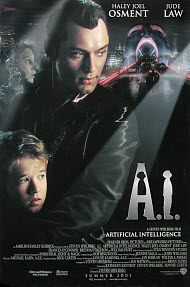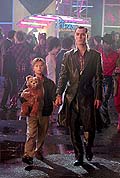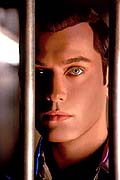A.I.: Artificial Intelligence
 for some sexual content and violent images.
for some sexual content and violent images.
Reviewed by: Carole McDonnell
CONTRIBUTOR
| Moral Rating: | Average |
| Moviemaking Quality: |
|
| Primary Audience: | Teens Adults |
| Genre: | Sci-Fi Fantasy Drama |
| Length: | 2 hr. 25 min. |
| Year of Release: | 2001 |
| USA Release: |
June 29, 2001 (wide) |



Eternal life—What does the Bible say about it? Answer
Why does God allow innocent people to suffer? Answer

What about the issue of suffering? Doesn’t this prove that there is no God and that we are on our own? Answer
Does God feel our pain? Answer
The Origin of bad—How did bad things come about? Answer
What kind of world would you create? Answer
Learn how to make your love the best it can be. Discover biblical answers to questions about sex, marriage, sexual addictions, and more.Life Before Birth (stories and articles with a pro-life perspective) Index
Why aren’t my prayers answered? Go
Am I good enough to go to Heaven? Go
What is the being of light encountered in near-death experiences? Answer
Suicide—What does the Bible say? Answer
What does the Bible say about intelligent life on other planets? Answer
Are we alone in the universe? Answer
Does Scripture refer to life in space? Answer
questions and answers about the origin of life
| Featuring |
|---|
|
Haley Joel Osment Jude Law Frances O'Connor Sam Robards William Hurt |
| Director |
|
Steven Spielberg |
| Producer |
|
Warner Bros. Pictures DreamWorks SKG Amblin Entertainment Stanley Kubrick Productions Kathleen Kennedy Steven Spielberg Bonnie Curtis |
| Distributor |
In today’s movies, characters routinely discard and shrug off people who love or need them. “A.I: Artificial Intelligence”, the Steven Spielberg film, will touch most people… all but the most adrenaline-addicted unfeeling moviegoer… because it shows us the pain and consequence of love.
When the film begins, we see Martin, the cryogenically frozen son of Monica and Henry. Because her son is in a state that is neither life nor death, Monica is unable to grieve. Meanwhile, in a Mecha (android) think tank, Professor Hobby (William Hurt in his usual cold performance) has shared his new plans with his colleagues: he wants to create a mechanical boy who can love. One of the professor’s colleague asks the question: “Can humans truly love an android?” The professor answers that God made Adam to be loved. But this, as any audience member knows, does not begin to delve into the murky waters of creating a loving child whose object of affection is mortal and has free will. Monica and her husband are chosen to be the parents of the mechanical boy, David. Initially upset, she comes to like David and makes a fateful decision that will begin to make David a living soul, much to the audience’s grief and sorrow.
 Like Pinocchio, David ends up in the cold hard world. With Haley Joel Osment playing the character so wonderfully, David the Mecha becomes an object of care and love for the audience. He is not only a motherless child, but a rejected adopted child—even worse… his lack of normalcy makes him seem like a special child… someone who might be slightly autistic, deaf, or mentally retarded. This is a kid that will tear a woman’s heart apart. The audience’s worries for this child gets even worse when we discover what the real world is like. Apocalyptically speaking, the world is well on its way to hell or highwater. The Polar Caps melted and the human race—sinful and violent in its “ritual of blood and electricity”—has almost been destroyed by a flood of Biblical proportions. The only decent people left on Earth are the androids—who with no free will—are loving and programmed to follow their prime directive. Even Gigolo Joe (Jude Law), David’s companion and polar (but obedient to his program) opposite. He is sensual and sexual, yet innocent and guiltless.
Like Pinocchio, David ends up in the cold hard world. With Haley Joel Osment playing the character so wonderfully, David the Mecha becomes an object of care and love for the audience. He is not only a motherless child, but a rejected adopted child—even worse… his lack of normalcy makes him seem like a special child… someone who might be slightly autistic, deaf, or mentally retarded. This is a kid that will tear a woman’s heart apart. The audience’s worries for this child gets even worse when we discover what the real world is like. Apocalyptically speaking, the world is well on its way to hell or highwater. The Polar Caps melted and the human race—sinful and violent in its “ritual of blood and electricity”—has almost been destroyed by a flood of Biblical proportions. The only decent people left on Earth are the androids—who with no free will—are loving and programmed to follow their prime directive. Even Gigolo Joe (Jude Law), David’s companion and polar (but obedient to his program) opposite. He is sensual and sexual, yet innocent and guiltless.
 “A.I.” will remind the viewer of many films and stories, including “Blade Runner”, “Pilgrim’s Progress,” “The Wizard of Oz” and primarily “Pinnochio.” It’s a film that asks several moral question: “Would humans be better if God had programmed and without free will?” “Are we responsible to those who love us?” “Does someone’s love for us make us responsible to them? Especially if we caused someone to love us because we needed love at a particular time? And should we drop someone out of our lives simply because they are no longer needed?” These moral questions are asked in a sci-fi/fantasy film but they are questions most people face at one time or another.
“A.I.” will remind the viewer of many films and stories, including “Blade Runner”, “Pilgrim’s Progress,” “The Wizard of Oz” and primarily “Pinnochio.” It’s a film that asks several moral question: “Would humans be better if God had programmed and without free will?” “Are we responsible to those who love us?” “Does someone’s love for us make us responsible to them? Especially if we caused someone to love us because we needed love at a particular time? And should we drop someone out of our lives simply because they are no longer needed?” These moral questions are asked in a sci-fi/fantasy film but they are questions most people face at one time or another.
David’s journey towards a “defined” kind of boyhood that only focuses on being loved by mommy is problematical because there are times when the viewer wants him to give up his dream. He is, however, a boy. Forever a boy-toy, he has no other purpose but to be worthy of his creator, whom he believes is his mother. His purpose is seemingly futile—Boy-toys last for only a season and are discarded when something better comes along. Yet his childlike persevering faith in the blue fairy is so strong and innocent and the world is so cruel, that the viewer hopes against hope for a “fairy-tale ending.” The innocent, we feel, should not suffer like this.
There are two scenes that suggest sexuality and some snide cracks against the Christian God and the Christian community. Gigolo Joe comments on humanity’s belief in their own Maker and their need to pray. His commentary on those who pray to their Maker is that he usually picks up some people who exit the chapel. Humans do not pray as deeply or as intensely to the Virgin Mary as a mechanical boy will pray to the Blue Fairy. Gigolo Joe scorns the human faith but readily believes in the faith of a mechanical boy. In addition, some destructive dogmatic types who “celebrate Life” seemed like the usual Hollywood knocks at the Right-To-Lifers and the Christian Right. Young children might be disturbed by the theme of a lost mother and by the sibling rivalry.
As usual, savior-aliens are ever helpful in Spielberg’s films. Although, I find myself increasingly more annoyed at these saving beings of light, I accepted their presence in this film because I wanted some kind of happy ending for David. The ending will cause many discussions as to what actually happened and is the ending “happy” or not. How are we to react to what appears to be the end of his suffering? Christians will be on both sides of that discussion. It is good, however, to see a film that challenges us to love those who love us. This is one of the most memorable, meaningful and touching films of the summer. Definitely a tear-jerker.


[Average / 2]
[Very Offensive / 1]
Spielberg does not come right out and offend you with harsh language, but the couple of GD’s were absolutely unnecessary. A sexbot? Building entrances that look like you are walking between a girls legs?
A place of prayer in the middle of Rouge city, where the sexbot likes to pick up woman? Flesh fair? Dr Know? The few bible references were used sarcastically. Osment and Law played their parts great, and that is the only complement I can give this movie. The movie went from boring and dull to just plain ridiculous. Praying in front of the blue fairy? David smashes another AI, and ***WARNING: PLOT SPOILER*** soon after decides to just give up his life. Can an AI commit suicide? Hey the movie made me think! Save your money. I have never been so disappointed in a movie.
[Average / 1]
The movie is clearly more art gallery than amusement park-surreal and disturbing, beautifully lighted and photographed. From a Christian perspective, the most notable point that is missing is the absence of God in the love equation and origin equation. There is little here to make us laugh or even smile (except for “Teddy”). It is clearly adult fare. (Apparently, Haley’s mom won’t let his younger sister see it.) Rent it when it comes on video and watch it when the kids are in bed.
[Average / 4½]
That said, it is a sci-fi movie and can’t be taken in the sense that one would a normal film. I will also say that production-wise it is one of the best of 2001 (and I obviously don’t have to point out the connotations of the release date). My actual reason for commenting on the film is in response to something the guest reviewer Carole McDonnell, along with some of the viewer commentators, have mentioned, the aliens at the end of the film.
***SPOILER WARNING*** That was not a scene about alien saviours (which goes without saying since there were no humans left to save) and those were not in fact aliens at all at the end of the movie. I do not want to give away their actual identity, but it is foreshadowed a couple times at earlier points in the movie (when we see David for the first time and Gigilo Joe’s comment about what is to come in the end).
[Better than Average / 5]
One comment on the review: The “alien saviors” are actually Mecha who have developed themselves in the absence of humans who are long extinct. This is why the boy-robot, David, is so special to them. He is their Adam, so to speak, and the only one who remembers a living human… and it is humans who originally “created” them. In the end, the boy, David becomes more than a robot, not only by virtue of his ability to imagine and dream, but also by the tenderness of concern he shows toward his “mother” during her last day on Earth.
Terrific movie for raising the hard questions and challenging us to dig into our own understanding of life in this modern world according to our walk of faith in Christ.
[Very Offensive / 3]
[Better than Average / 5]
The acting is superb by Osment, Law, and the Teddy Bear which is absolutely hilarious. That was one the suprises is how funny both Law and the Teddy Bear are. I would not recommend this for the 13 and under crowd though. It has a smaterring of violence and sexual innuendo which was truly very tame for Hollywood. Go see this extrodinarly rare jewel.
[Good / 5]
[Better than Average / 4]
We must remember that David is not a real person, and the scene in which he prays to the “blue fairy” (similar to Catholics praying to Mary, if you ask me) may be construed as one which says that prayers are not answered. But our prayers to the one true God are answered in real life. There’s also the issue of the “flesh fair,” in which humans delight in the destruction of their mecha counterparts—that’s also unsettling to watch as some of the mechas have become almost human.
It’s a slight reminder that we must not become too attached to machines of any kind, because they fall apart and fade away, unlike the love of Christ for us. Watch with discernment.
[Average / 4½]
It is easy to believe that if we had this kind of technology available to us we would use it for things like sex or replacing children. In our sinful arrogance we’d play God. Unlike other films A.I. shows mankind as he is not as he thinks himself to be.
[Very Offensive / 5]
Scripture states that God is the author and perfector of life, not mankind! If one were to compare the predictions of this movie with Revelation there is zero correlation (I went thinking there might be). What was I thinking? Much violence in a certain and lengthy scene.
[Extremely Offensive / 4½]
It seems to me that Spielberg has woven a tale that pits man’s creation (mechas) against God’s creation (orgas) in order to show that man can do better and that God, as understood in the Judeo-Christian worldview, is not the only life-giver. Honestly consider the central characters in A.I. The humans are spiteful, self-serving and fear-driven; while the robots are sincere, selfless and dedicated. The Flesh Fair paints this contrast starkly.
Gigolo Joe exists only to serve women and fulfill their innermost needs which real men can never meet. David only wants Mommy to love him back and can see no other purpose for existing than to please Mommy. What a contrast to Daddy who is unpredictable in his attitude toward David: loving and supportive one moment, hostile and intimidating the next. It’s so obvious that the mechas are presented as more “human” than the humans. Even the actors (Jude Law and Haley) turn in vastly superior performances. Haley’s performance as David is outstanding and deserves an oscar nomination.
I do think, however, this movie is worth seeing. Its final third is dreadfully slow-paced and unnecessarily drawn out. DON’T READ THE NEXT LINE IF YOU DON’T WANT A SPOILER ON THE FILM’S ENDING. The whole 2000 year freeze, subsequent resurrection, and alien superiority angle was completely ridiculous and dissatisfying.
One final comment for thoughtful Christians. Take note of Prof. Hobby’s statement in the first scene. He proposes creating a robot that can genuinely love a human (we later learn that Prof. Hobby has lost his real son and that David is a reproduction of that lost son.) The ensuing conversation is most [thought-provoking].
[Average / 4]
[Average / 3]
Even for adults, the plot line is disjointed, much of the dialogue is literally painful to listen to, and the visual experience as a whole is just plain weird-Kubrickian, as a matter of fact. What passes for the film’s resolution is contrived and anticlimactic, mainly because any semblance of a coherent story line had long since disappeared.
The one bright spot in the movie is the performance of Haley Joel Osment; the youngster is a brilliant actor, no question about it. Unfortunately, he has a mess of a role to work with, and the supporting actors fare even worse. Very rarely does the audience feel a connection with the characters in the film, and all that’s left is to try to make sense of the movie on a strictly cerebral level, no easy feat in this case.
You get the feeling that this is one of those movies that was made to impress the people who vote for Academy Awards. Nobody really understands what the movie is about, but thanks to the cachet of Spielberg and Kubrick, no one dares admit it.
Not being bound by such conventions, I can honestly say this was one of the most disappointing film-going experiences I’ve had in a long time. I was glad we went to a matinee so I didn’t have to add insult to injury by paying full price… All in all, “A.I.” was a negative spiritual experience. Don’t waste your time or your money on this mess.
[Average / 1½]
It also speaks about the creation of this “Perfect Love” in quantities for mass consumption without the need to commit to the same. Even as we had ruined the planet with our need to “have more” we had created “disposable people” to interact with and ignored the (Real) people around us, because they can’t give us what we want without needing or expecting something in return.
The movie has many layers, and there is still more I could comment on, but, I will say this, it is positively scary how this seems to be happening right before our eyes when our kids would rather play a video game with someone who may not even be in the same country, than go out and play with someone in person. Or the kid who would rather “Text” or “Facebook” someone just down the block, rather than pick up the phone and have a real conversation with them or get up and go visit in person. The realities of this movie may be much closer than you believe.
I will say this in closing: The “Aliens” at the end of the movie are not from another planet, they are what the “Mecha” on Earth evolved into, and David was special because he had “Touched the Creator,” so those who think this movie does not say anything about God are wrong; it speaks VOLUMES about God, you are just too blind too see it. The whole point of the movie is: “This is what happens when Man is God.”
Moral rating: Better than Average / Moviemaking quality: 5
[Average / 5]
Do not bring your kids to this film expecting to see an E.T. type movie… its not! Stick with the PG-13 rating and bring your teens… any younger than that and I think it would be too intense. Also this is a thinking movie; that is, it gets your mind working. If you like to sit back and simply be entertained without having to think about anything, don’t see this film. … Excellent film! Highly recommended! The ending is especially unexpected… but WELL worth the wait!
[Good / 5]
First of all, there is no happiness—just sadness and pain. Then as the movie progresses the robots begin to get weirder and weirder (there’s even a scene with a male robot prostitute convincing a woman that she really is ready to experience a “real” man). Soon we see a chase scene involving many warped and mutilated robots who are grotesquely lifelike.
At this point, about an hour into the movie, my 15 year old sister asked if we could leave, it was just too disturbing. I was pretty grateful that she wanted to, since I also was not enjoying myself. I am an avid movie goer and this is the first time I have ever walked out on a movie. This movie is only for the science-fiction and oddity lovers.
[Better than Average / 3]
This is a story that gets one thinking about the nature of love and humanity. I’d definitely recommend it. …Some of the scenes with the damaged robots could induce nightmares and would be too much for little minds. Bring the thoughtful teens and leave the babes at home with a sitter.
[Average / 4½]
But what makes “A.I.” feel most like a Kubrick film is its uncanny ability to reveal more and more with each rewatching. You will discover whole thought lines that you missed the time before—multiple times! Quite a few movies do this, but none do it to the extent that a Kubrick film does it. Anyhow, I promise you this: if you have only watched “AI” once, you didn’t get it. Period. I loved it to death the first time I watched it, but I didn’t get it, either.See all »
Moral rating: Offensive / Moviemaking quality: 5


I do caution that although there is a child at the center of this film; it is not a film for children… Spielberg points out the historic direction that VCRs and Internet has taken. Both have been used to make porn more acceptable. It is not difficult to imagine that machines could be exploited for this use. David’s path is similar to Pinocchio, but when faced with temptation, he resists and sticks to his quest to earn the love of his mother.
The violent treatment of mecha’s and the trip through Rouge City are not scenes for young eyes. You cannot help but be drawn into every struggle David makes in his journey for unconditional love. David does not always make perfect choices. There is a disturbing scene of David killing another mecha and he also becomes depressed and tries to take his life. Spielberg is, however, respectful of God and scripture.
I do not agree with all the ideas of this film, but I do recommend it to discerning adults. It does not have any language or substance abuse. It is a compelling drama to discuss with your teen. I do highly recommend that you leave your children at home.
My age recommendation is 16 and older. My teenage son and I had a very engaging discussion after the film. I am not sure what audience this film will try to find, but Spielberg may have finally succeeded in making a commercially offensive film that will get the notice of the Academy.
My Ratings: [Average]